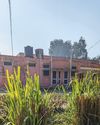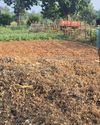
ALL RESIDENTIAL in Kapashera societies extract groundwater. But we never thought it could lead to the sinking of our land," says Rajesh Gera, president of Surya Vihar Housing society in southwest Delhi, which is less than 10 km from the Indira Gandhi International Airport.
In 2014, one of the pillars in the parking lot of the society developed cracks. By 2019, the crack had widened so much that the entire building could have collapsed. This June, when Down To Earth (DTE) visited the society, Gera showed the repaired crack, which had reached more than 1.5 m in height. "We initially ignored it and then blamed the builder for poor construction. Now we know it is happening due to land subsidence triggered by excessive groundwater extraction," he says.
Residents tell DTE that apart from the threat of a collapse, they are also seeing the groundwater levels declining rapidly. In early 2000, the society had four borewells at a depth of 200 m. By 2020, two of them had dried up.
Shagun Garg, who is currently at the University of Cambridge, UK, had established the link between groundwater extraction and land subsidence in Delhi in 2020. He had found that land subsidence at Kapashera was happening at a rate of 17 cm per year, or roughly the length of a smartphone. Garg came to this conclusion after he monitored the land subsidence rate at four locations in the National Capital Region in 2014-16, in 2016-18 and in 2018-20. Apart from the residential society, he found subsidence at Fun and Food waterpark in Surya Vihar, and at Raja Nahar Singh International Cricket Stadium and Piyush Mahendra Mall in Faridabad.
This story is from the {{IssueName}} edition of {{MagazineName}}.
Start your 7-day Magzter GOLD free trial to access thousands of curated premium stories, and 9,000+ magazines and newspapers.
Already a subscriber ? Sign In
This story is from the {{IssueName}} edition of {{MagazineName}}.
Start your 7-day Magzter GOLD free trial to access thousands of curated premium stories, and 9,000+ magazines and newspapers.
Already a subscriber? Sign In

TERMITE TRAP
A common tall grass variety provides a chemical-free option to control termites, highlights the need for mainstreaming local ecological knowledge

CLIMATE'S UNSOLICITED PAYOUT
Rising weather extremes is destabilising the insurance industry, driving up premium prices and pushing insurers out of high-risk markets. The crisis is also spurring re-invention of insurance sector.

NOTHING PSEUDO ABOUT IT
The fibre-rich banana pseudo-stem is a treasure trove of minerals and health benefits

Organic move
After 10,000 farmers in Dantewada district secured Chhattisgarh's first organic certification, the entire district now gears up to transition fully to organic farming

No more a rarity
What has caused widespread outbreak of the rare Guillain-Barré syndrome cases from seven states of the country?

DeepSeek AI model is a sobering idea for India
The Chinese artificial intelligence breakthrough reveals how far behind India is in the race for technological prowess

'Fragile terrain not the cause of tunnel collapse but an excuse'
In November 2023, the under-construction Silkyara Bend-Barkot tunnel in Uttarakhand collapsed, trapping 41 workers under the rubble. The rescue operation in the 4.5 km tunnel lasted 17 days and involved multiple teams. Australian geologist ARNOLD DIX, who is also the president of Switzerland-based International Tunnelling and Underground Space Association, as well as an engineer, a barrister and a farmer, assisted in the mission at India's request. Dix has now written a book on the incident. In an interview with ADITYA MISRA, Dix says the mishap was a failure to adapt construction methods to the rock conditions encountered. Excerpts:

BUDGET SQUEEZE
Poised to woo the middle class and tame fiscal deficit, Union Budget 2025-26 cuts corners on key welfare schemes, offers little for climate adaptation and decarbonisation

Decoded script
Genomelndia project creates genomic sequence database of 10,000 Indians, moving a step forward in disease detection and treatment

Introduce layers in poverty measurement
This is with reference to the article \"Convenience of poverty lines\" (16-31 January, 2025). Poverty is not like atmospheric pressure, which can be scaled down with high-precision instruments. It is a matter of deprivation. Poverty is also highly misunderstood. At one extreme, poverty means no food, no clothes, bad health and inadequate shelters; in essence a dearth in common and customary amenities. One can recognise this poverty. But, even if a person's conditions are only a notch above this level, their situation slides through the slick fingers of all the measurement of figures and wielders of statistics.